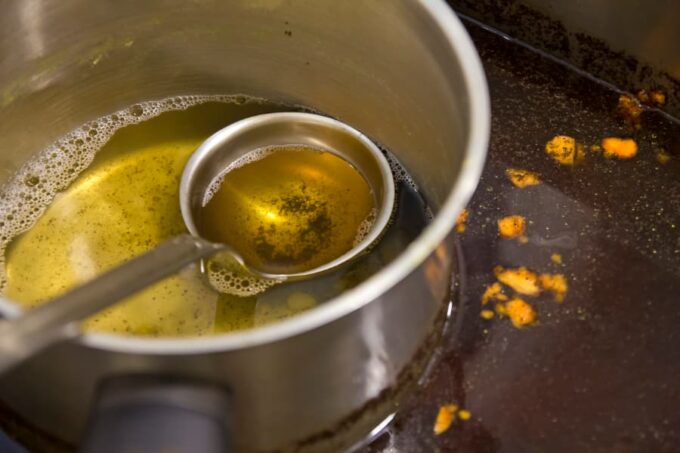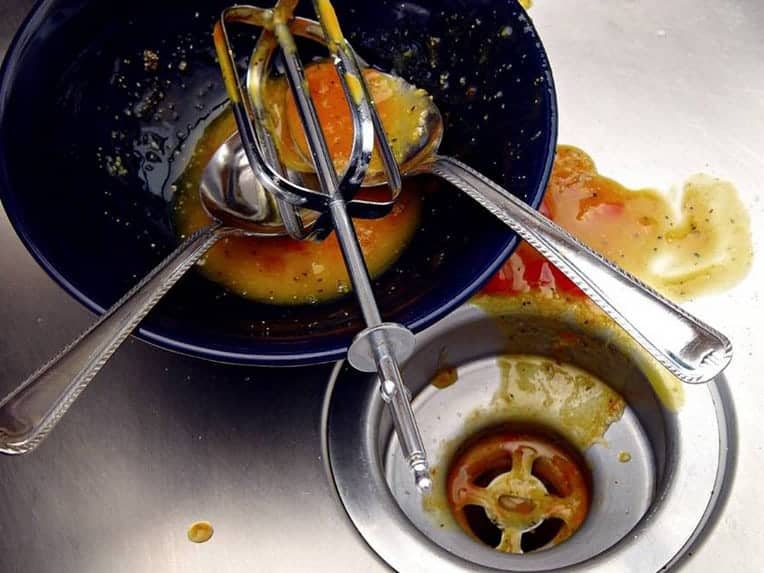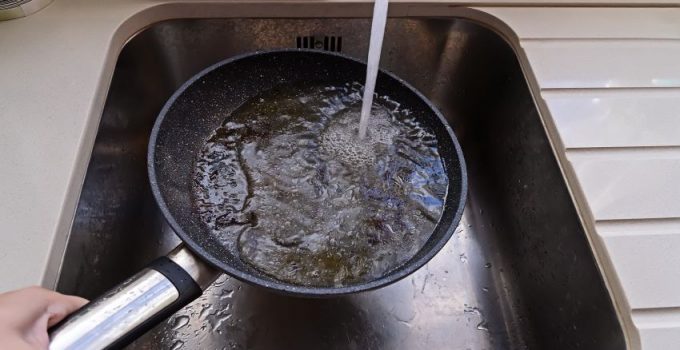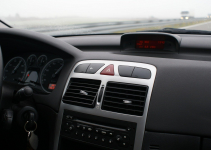We hope you don’t throw solid leftovers in the sink drain, but there’s something else that can clog it, and that may not sound logical to you. Namely, after it cools down, most of the fat does not remain in liquid form but hardens and sticks to the pipes. In other words, butter, coconut oil, grease, and the like can create significant problems for you in the kitchen. Anything heavier than water, such as grease, along with food particles, can usually stick just where the U-shaped pipe is, just below the sink.
Anything heavier than water gets stuck in that place, and these pieces of oil and food can cause unpleasant odors from the kitchen drain in a short time, but they can also wholly clog the pipes. Olive oil, for example, will not harden at room temperature, but that is no reason to pour it into the sink without thinking because it is hydrophobic, which means that it does not mix with water.

Source: choosesq.com
The oil goes straight to the pipes and combines with pieces of food, hairs, and other waste in the drain and creates a plug, sending water from the sewer back into the tube. Use the sewer system properly and take immediate action in case of problems.
If you still have an accident with the drain in the kitchen, or you want to find out more about this topic, take a look at greasetrapcolumbus.com and learn more.
Home sewers should have no problems if they are correctly installed, built, and used. If there are problems such as an unpleasant smell from the sewer, clogging of pipes and drains, and flooding, something is wrong.
You must understand what can go wrong; it is best to start with the basics of what a sewer is and how it works properly. A domestic sewer is a system for collecting and removing dirty water from origin to the connection to the external sewer or wastewater treatment system.
Proper use of sewage

Source: homeinspectorpotomac.com
You must avoid problems with both sewer systems; proper use is crucial. The instructions are simple: do not burden the sewer system with dirt and foreign bodies. Do not throw into drains: household oil and grease. The kitchen sink drain is most often clogged due to grease deposits.
Also, regular annual inspection of joints, an inspection of connections, replacement of leaking pipe parts with new ones, and, if necessary, cleaning of siphons and connections are recommended.
When cleaning the drain with chemicals, keep in mind that aggressive chemicals can damage pipes and rubbers, and hazardous chemicals can harm the environment. Clogged pipes are the most common sewer problem. If you follow the instructions, you will avoid the most common problem of these two sewer systems – that they become clogged and that polluted water spills all over your house.
In most cases, pipes become clogged due to improper use, most often due to grease and oil that should not be thrown down the drain in the sink. Do not spill grease in the sink to avoid emergency plumber, such as Hunt’s Services, intervention and repair of sink malfunctions. Do not spill oil in the sink and drain as the price of carelessness may end up being too high. When the sink thickens, the plumber must quickly and efficiently solve the problem in the bathroom.
One of the most common things we pour into the sink drain is grease. We do it that way without thinking about the consequences that can occur over time. It is wrongly believed that fats that are slippery liquid cannot be the cause of congestion. Grease and cooking oil are the leading causes of blockage of the sink drain, as well as if you spill them into the sewer through the sink. Whenever you pour hot grease into the drain, it sticks to the pipe. Hot water can never wash away grease.
It settles over time until it eventually blocks the entire drain. In addition to oils and fats, some foods are full of fat that should not be poured into the gutter. These are butter, sour cream, mayonnaise, cheese, cream. Even grease from the plate can create a problem if it is found in the drain.
What to do if fat accidentally gets into the drain?

Source: fastplumbers.net.au
One or more spills will not immediately cause the drain pipes to become clogged. Be sure to wait for the grease to cool before inserting it into the garbage because you could inadvertently melt the garbage bag if the oil is hot. To clean the grease from the sink and drain, occasionally boil water, add vinegar and baking soda and pour it into the sink so hot. That way, the fat will break down, and the drains will smell fresher.
It is pretty easy to detect whether grease is clogging the drain. You will notice that the water drains more slowly, and you can hear gurgling as the water goes down the drain. Also, unpleasant odors from the sink may indicate that you have a grease blockage that is just waiting to make a bigger problem. Try to avoid clogging the sink by following our tips.
The need for water purification occurs in areas where sewage clogging occurs, especially in the case of the appearance of water that is greasy or dirty or if it contains residues of plant or animal origin. When flowing through the sewer, clogging occurs due to the adhesion of grease to the network walls, which can lead to problems.
Grease and oil separators are placed between the place where dirty water from the kitchen enters the sewer and where the purified water flows into the sewer network. Care should be taken here to ensure that the separator is placed at the optimal distance from the inlet of contaminated water into the system. In this way, better separation results are achieved by reducing the temperature of the dirty water.
Do you regularly maintain your drains in the sink, and do you know that you must not throw oil and grease inside so that the drains do not clog?







